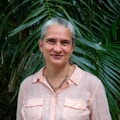Rachel Collin, Ph.D.
Staff scientist , Smithsonian Tropical Research InstituteDirector, Bocas del Toro Research Station

As a marine biologist with expertise in aquatic invertebrates, Rachel Collin focuses on documenting tropical biodiversity and understanding how environmental conditions and climate change impact the reproduction, development and survival of diverse animals. She received her master’s degree in zoology from the University of Washington, where she worked at Friday Harbor Labs, and her Ph.D. in evolutionary biology from the University of Chicago, where she worked at the Field Museum. As a staff scientist at the Smithsonian Tropical Research Institute in Panama since 2002 and director of the Bocas del Toro Research Station, she has transformed the Research Station into one of the most active marine laboratories in the Caribbean. She is also a past president of the Association of Marine Laboratories of the Caribbean.
Collin’s research with snails, sea urchins and corals shows how current environmental conditions on tropical reefs and in seagrass meadows may be stressful for their inhabitants. Marine heatwaves, hypoxic events and even normal seasonal changes can impact animals’ ability to function. Stressors shape the distribution of each species, and early developmental stages may be particularly vulnerable. She has used her specialist knowledge to show that surveys of marine invertebrate larvae reveal biodiversity not recorded during surveys of adult animals. In addition, she is the taxonomic expert on a family of snails (the Calytraeidae) and has described and named a dozen species in this group.
Collin’s lab is a training ground for undergraduate students from the region, who she involves in research projects from their inception and design to preparation for publication. Her passion for international training led her to found the Training in Tropical Taxonomy program, which has trained students from 35 countries in specialist marine biodiversity knowledge and skills. For the past 18 years, this program has trained a diverse next generation of taxonomic experts, increased global access to specialist knowledge and built international networks and communities of practice.
Research Blurb
As a Simons Foundation Pivot Fellow, Rachel Collin will learn how to study ecosystem processes in coastal wetlands and their role in global systems and climate change. This will move her focus from animals to plants, soils and microorganisms; from individuals to whole ecosystems and the global climate system; and from low-tech to high-tech instruments and methods. Understanding the biogeochemical processes and the role microbes play in preserving carbon in wetlands and in producing greenhouse gases, such as methane, is vital to understanding the net influence of the ecosystem on our planet’s climate.
She plans to leverage this new expertise in measuring holistic ecosystem function to understand the role of biodiversity of microbes and invertebrates in influencing carbon sequestration and methane flux. Invertebrates and microbes are important players in the breakdown of organic material. Crabs bring leaflitter into their burrows and burry it quickly after it falls. Their burrows are pathways for oxygen to enter otherwise anaerobic soils, altering the potential for carbon storage. Bivalves known as shipworms play a major role in breaking down coarse woody debris, which they digest with the help of endosymbiotic bacteria. Within the sediments, tiny animals and diverse protozoans continue the process of breaking down the plant material. Collin plans to combine her old and new expertise to ultimately understand the role of these animals, the plants and the microbes in overall ecosystem function, and how ecosystem function may be impacted by global environmental change and by biodiversity loss.